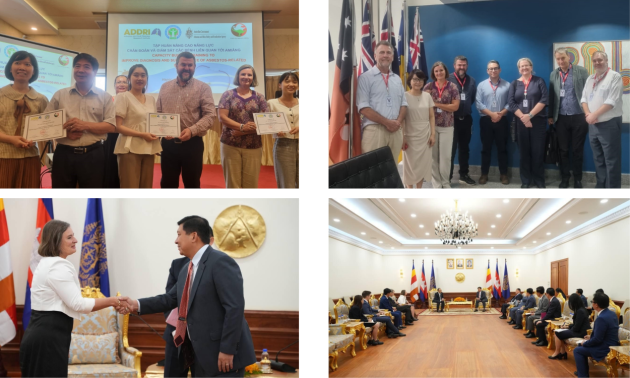Capacity building activities in South-East Asia
A lack of expertise and ability to diagnose asbestos-related diseases (ARDs) in many South-East Asian countries that still use asbestos means that there is no visibility of the extent and impact of ARDs in these countries, which is hindering the introduction of asbestos controls, including bans.
As part of our international role, Julia Collins, Director of Awareness and International, visited Laos and Vietnam in May 2024 to deliver a training program on diagnosing and treating ARDs in conjunction with the Asbestos and Dust Diseases Research Institute (ADDRI) and Union Aid Abroad – APHEDA.
A three-day program was presented in Vientiane, Lao PDR and in Hanoi, Vietnam, led by Australian experts in radiology, pathology, oncology and epidemiology. The program included visits to the Cancer Center, the Health University and the Mittaphab Hospital in Vientiane. Participants welcomed the opportunity to discuss their challenges, such as the lack of some diagnostic equipment in Lao PDR.
In Hanoi we visited the Vietnamese National Institute of Occupational and Environment Health and the National Lung Hospital.
Julia spoke about the incidence of ARDs in each country using the Global Burden of Disease data, highlighting that immediate action is needed to stop using asbestos to avoid the same trajectory that Australia is experiencing. Meetings were also held with the Australian Ambassadors and embassy officials, who are very supportive of awareness raising and capacity building activities to address asbestos exposure risks.
Outcomes of the training include:
- developing a patient exposure history questionnaire and clinical guidelines for diagnosing ARDs
- refresher training sessions in the three specialties and assistance in diagnosing actual cases as they arise, and
- establishing a central register of asbestos exposure cases and confirmed diagnosis of mesothelioma and ARDs more broadly.
This was followed by a visit to Phnom Penh, Cambodia, to discuss progress in implementing the Cambodian Government’s decision to ban asbestos in 2025. Julia Collins and APHEDA representatives joined the Australian Ambassador at a meeting with Cambodia's Deputy Prime Minister and Minister of Land Management, Urban Planning and Construction, His Excellency Say Samal, and senior officials from his Ministry. Shortly afterwards the Ministry released a statement that it ‘will work with the Australian Government to completely eliminate the use of asbestos in construction and urban planning to improve citizens’ quality of life’.
We continue to work with APHEDA, ADDRI, Australian embassies and the Department of Foreign Affairs and Trade to end the manufacture and use of asbestos in South-East Asia.



